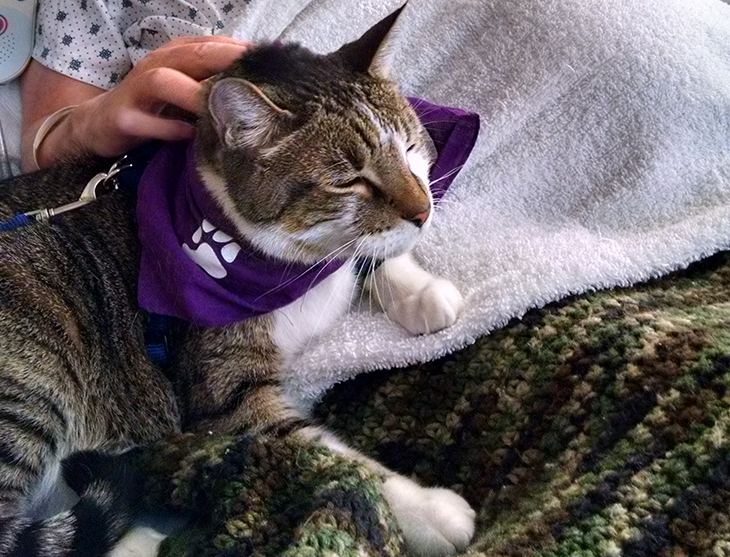At the Durham VA Medical Center in North Carolina, cats rule. Well, one cat anyway. His name is Archie, and he plays a major role in the medical center’s pet therapy program.
“It’s a form of therapy you don’t need a prescription for, or a doctor,” said Jessica Cornett, a recreation therapist at the Durham VA’s long-term care unit and psychiatric acute recovery center. “An animal gives you unconditional love. They don’t judge you. They just sit there and listen to you.”
“I love animals; I grew up with them,” she continued. “And a lot of our Veterans grew up with animals, so a cat or a dog is something very familiar to them. It triggers pleasant memories.”
In the moment
Cornett, 29, said petting a cat or dog also allows a patient to briefly un-focus from any physical or emotional pain they may be in.
“Archie is calm,” she said. “He’s a calming presence and you feed off that calmness. And for that moment, you’re not in a hospital bed anymore. You’re back home.”
For some Veterans on Cornett’s long-term care unit, Archie isn’t just a pleasant trip down memory lane. He’s much needed companionship.
“Some of our Vets here have really great support systems,” said the recreation therapist. “People come to see them. Others aren’t so lucky; they don’t get too many visitors. So when they get to spend some time with Archie or another therapy animal, it shows them they’re still cared about, and loved. It shows them they’re not alone.”
Breaking through
In addition to his Zen-like calmness, Archie has another notable trait: an uncanny ability to break down emotional barriers. His mere presence seems to coax some of the more introverted patients out of their shell.
“Some of our Veterans tend to isolate, but I’ve seen a lot of them warm up and become more social after spending time with Archie,” Cornett said. “Some of them even start wanting to get involved in some of our other activities, like art therapy or music therapy.”
She added: “We have several therapy dogs that come in. So far Archie is our only therapy cat, although he’s kinda like a dog.”
And what kind of therapy does Archie provide, exactly? Prolonged Exposure Therapy? Cognitive Processing Therapy? What’s his specialty?
“He gets on your bed and cuddles up,’ Cornett said. “He lets you pet him. He zones out and goes to sleep.”
Archie’s ‘mom,’ 25-year-old Amanda Hewitt of Raleigh, agreed. “His favorite thing is to curl up with you on your bed. He wants to cuddle and spend time with you. He wants to get loved on.”
“So he stayed”
Archie and Hewitt first met about seven years ago. “My parents and sister brought him home,” she said. “We weren’t going to keep him, but we couldn’t find his owners. So he stayed.”
Hewitt and her furry friend work as a team at the Durham VA, quietly going from room to room to see who might be up for a cat visit. Most of the patients brighten considerably when Amanda places the big tabby on their bed.
“Usually they’ll talk to me while they’re petting Archie,” Hewitt said. “They’ll talk to Archie, too. They usually start out talking about pets they’ve had in the past. Then they’ll start talking about other things; their family, their time in the military. I really just sit and listen. Archie’s the one who breaks the ice and gets the conversation started.”
Fifty-seven-year-old Dave Griffith, an Army Veteran, can no longer hold a conversation. His illness has left him without the ability to speak, but he can still smile and pet Archie’s soft fur.
“Dave is a cat person….always was,” said Dave’s wife, Jennifer. “When Dave was young he had a cat named Morris. He would mess around with Morris, calling him and pretending he couldn’t see or hear him, even though Morris was right there meowing at him. Dave loved to mess with him.”
Now Archie is the new Morris in Dave’s life.
Just chillin’ out
“They bring the cat in, and he just lays down and Dave pets him,” Jennifer said. “That’s Archie’s job, to just lay there. He’s one of the most chilled out cats you’ll ever see. Some cats are skittish if you bring them into a new place, but not Archie. Just the way he chills out on the bed is hilarious. He flops down and that’s that.”
Amanda Hewitt noted that the friendly feline is not just famous for his calm demeanor, but for his size.
“We were there visiting at the Durham VA a couple weeks ago,” she said, “and one of the patients yelled, ‘There’s a tiger in the hospital!’ Archie’s a bit on the large size…he’s about 15 or 16 pounds, depending on how much he’s had to eat that day. He’s not little. Some of the patients call him a bob cat.”
Hewitt smiled, recalling one particular Veteran who really looks forward to Archie’s visits.
“I had this one gentleman tell me that he never gets any visitors, and that having Archie and me come see him just brightens up his whole week,” she said. “He and a couple other patients are on our regular visit list. We always make sure we go see them. After that we just kind of wander around, seeing who might be up for a visit with ‘the bobcat.’”
Topics in this story
More Stories
Navy Veteran and president of the American Medical Association got a colonoscopy and encourages other Veterans to do the same.
Chicago Vet Center and VA gave women Veterans information on VA services available to them.
MVP’s research informs personalized care for Veterans, supporting whole health and beyond.







Breaks my heart to read of the vets who get no visitors! Amanda and Archie are performing wonderful acts of kindness and service!
Pets help to sooth and anchor one
Pets are great
Pets of the Homeless is the only national animal organization focused completely on feeding and providing emergency veterinary care to pets of the homeless. Should your clients need our help please have them call 775-841-7463 or visit http://www.petsofthehomeless.org